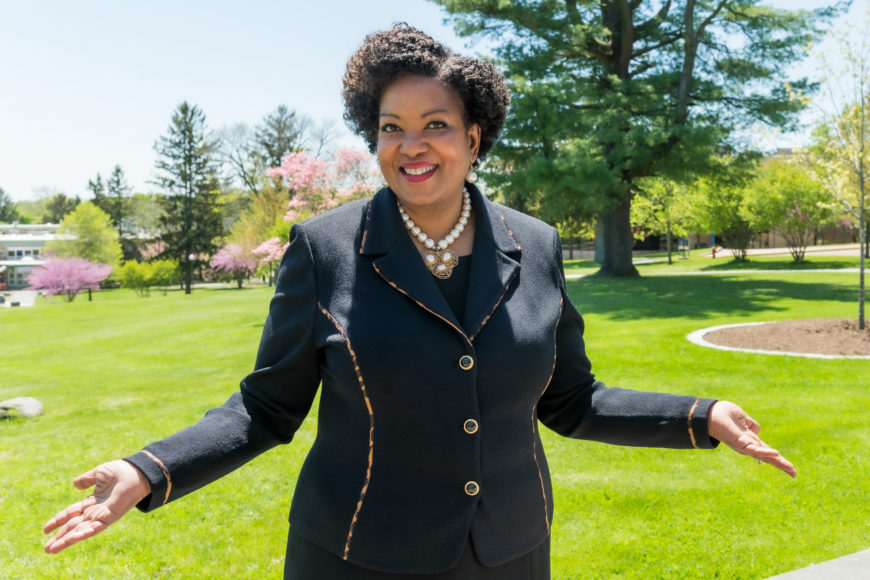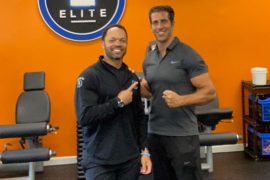With President Joe Biden proposing to make community colleges tuition free for two years; his wife, Jill, continuing to teach English at Northern Virginia Community College and philanthropist MacKenzie Scott recently donating $30 million to El Paso Community College, these versatile institutions of higher education are trending. They’re also at the center of another partisan political debate as conservatives argue for greater support for the more wide-ranging Pell Grants rather than tuition-free community colleges. (Of course, liberals note, that if community colleges were tuition-free, it would allow for underserved students to use Pell Grants for support services that would ensure they complete their education.)
Few are better equipped for this spotlight’s glare than Belinda S. Miles, president of 75-year-old Westchester Community College (WCC) in Valhalla, the largest college in the county and the State University of New York (SUNY)’s first federally designated Hispanic Serving institution.
Since her arrival in 2015, the college — which has 29,224 credit and noncredit students and 512 faculty members and staffers — has experienced increased graduation rates, new academic and workforce development programs and unprecedented growth in gifts to support scholarships and student programming. (While WCC does not have an endowment, it partners with the Westchester Community College Foundation, which distributes more than $2 million annually to students in the form of scholarships.)
Miles also engages the community as a member of the Westchester chapter of The Links Inc., serving African-Americans and the African Diaspora by providing programming support for Covid-19 relief efforts, enrichment for promising high school students and voter education initiatives. She’s a dynamic speaker, who galvanized the American Heart Association’s 2018 “Go Red for Women” luncheon in Rye Brook and the YWCA of White Plains & Central Westchester’s virtual 2020 “In the Company of Women” presentation, for which she was the keynote honoree.
Miles attended public schools in her native Queens, graduating from York College City University of New York (CUNY) with a B.A. in political science. She earned an M.A. in educational psychology and an Ed.D. in higher education organization and leadership development from Teachers College, Columbia University.
That led her to a number of faculty and administrative roles at LaGuardia Community College, Nassau Community College and Columbia University. Most recently, she served as provost and executive vice president of access, learning and success at Cuyahoga Community College with oversight of four campuses and many extension sites in the great Cleveland area.
When she’s not in her office, you may find Miles, a Westchester resident, on the links of the county’s public golf courses or in front of a microphone. She loves to sing and accomplished one of her bucket list items by singing “The Star-Spangled Banner” as part of the Tri-C Vocal Trio at a Cleveland Indians’ home game in 2011.
For her, community college is something to sing about:
President Joe Biden’s American Families Plan would include $109 billion to make community colleges like Westchester Community College tuition-free for two years. Why is that a good idea?
“Westchester Community College’s mission is to provide accessible, high-quality and affordable education to meet the needs of its diverse community. Even with our lowest-in-the-county tuition (less than $4,800 annually), the cost of higher education is a barrier for many to reach their full potential. In Westchester County, 8.4% of residents live in poverty, and students at WCC who apply for financial aid have a median household income of $33,808, compared to the county median income of $101,908. Removing the burden of paying college tuition is a major boost for families who will still have hardships posed by transportation, care for children and elders, housing and food insecurity, and other issues.”
The American Families Plan would also include $80 billion for Pell Grants for the severely underserved. Margaret Spellings, secretary of education under President George W. Bush, recently told Judy Woodruff, anchor of the “PBS NewHour,” that while Biden is right to focus on education, the Pell Grant is the better, more versatile way to go rather than underwriting community colleges for those in need. What’s your reaction to that?
“We applaud all efforts that give students the assistance they need to achieve their academic and career goals, including resources that help students get a strong start at community colleges like WCC where our students (who graduate with an associate’s degree) then successfully transfer to partner universities such as SUNY, CUNY and many private institutional partners. These include premier Historically Black Colleges and Universities that offer guaranteed junior standing upon successful completion of an associate degree.
“Currently, Pell grants are available to students at both institution types. They go further at community colleges where local municipalities often share in costs to keep tuition affordable. Also, with their distinctive ‘open door’ access mission, community colleges enroll millions of students — particularly students of color and those who have been historically underrepresented in academia — who might not otherwise have access to quality higher education. Investing resources for the first two years of collegiate study supports more equitable talent development.”
Recently, WCC student Bianca Braun was named a winner of the prestigious Jack Kent Cooke Scholarship, which awards students $40,000 per year to complete their studies at a four-year institution. Braun will be transferring to Harvard in September to earn her bachelor’s degree. Your own career has embraced both community college and the Ivy League (Columbia University). Make the case further for what community college offers.
“Harvard, Yale, NYU, Columbia, Cornell are among the many institutions that have accepted WCC graduates, and our transfer graduates routinely tell us that the quality of their experience with their WCC professors is on par with their experience at their four-year universities.
“Community colleges are comprehensive institutions that serve many types of learners throughout their lifetimes. We provide early college experiences for qualifying high school students who are able to earn college credits as part of satisfying their high school requirements. We offer high-quality education in career and technical fields that lead to entry in well-paying “middle skills” careers that require more than high school diploma but not the bachelor’s degree. Our students get a strong start to bachelor’s degrees. And community members can find a wide range of personal enrichment opportunities at our various sites within the region.
“Community colleges emerged as a disruptive innovation in higher education, democratizing access to higher learning with a powerful national network that now includes 1,044 colleges that are tuned to the local needs of their communities. Community colleges enroll four out of 10 of all undergraduate students in the U.S., according to the American Association of Community Colleges. Community college students are the first in their families to attend college, single parents, non-U.S. citizens, veterans, students with disabilities and even students with a prior bachelor’s degree.
“Almost 12 million Americans attend community college, and many more come to our campuses as a hub of intellectual capital and community engagement, where nearby you find the latest technology in action, train to become an essential health care professional, study to be at the forefront of the nation’s cybersecurity defense, attend a theater production, take in an art exhibit or enjoy a dance production. Commensurate with the open access mission and focus on equitable outcomes, community college graduates walk on the path of social mobility, with 21% of WCC’s graduates beginning their academic journey at the bottom fifth of the income quintiles and ending up in the top fifth later in life.”
As you’ve alluded to above, what makes community colleges unique is that they’re not just for the academically minded. Tell us about some of the business and trade courses that are taught at WCC.
“WCC has a wide range of offerings because we serve such a diverse population — diverse not just in race or ethnicity, but in age, interests, economic means and academic interests and goals. We have an Honors College that offers higher level challenges and academic rigor for students who aim for advanced knowledge and study at any number of elite institutions and choose to start their post-secondary journey at WCC to take advantage of our lowest-in-the-county tuition and, for many, proximity to home. And we offer opportunity programs for students who may have struggled academically in the past, yet seek the advantages of a higher education experience.
“Many students enter WCC with uncertain aspirations and take a general course of study to explore their options and discover their passion. Other students know where they want to be after graduation and have a more directed focus in their studies from the start. The more popular of these programs include nursing and other health care fields, cybersecurity, engineering science and fashion design and merchandising. These technical skills-oriented programs have been attracting increasing interest and support from corporations and funders in recognition of the need for a sufficient workforce well-trained for the economy of the 21st century.
“Oftentimes, students take advantage of our transfer agreements through which students spend the first two years of their post-secondary education at WCC, saving significantly on tuition costs and then seamlessly transferring to a four-year institution with full junior status. The academic rigor of a WCC education as well as the extensive academic supports provided by WCC counselors prepare these students with the skill sets and academic knowledge they need to succeed in their pursuit of a bachelor’s degree and beyond.
WCC’s Division of Workforce Development and Continuing Education (WDCE) provides shorter paths for nondegree-seeking students to explore new career opportunities, prepare for certifications necessary to enter or advance in high-demand fields such as health care, information technology or real estate and gain the skills and knowledge needed to pursue middle-skills career options.”
What attracted you to community colleges as a career?
“There is no better place to build minds and futures than at community colleges. These institutions are often places of refuge and hope for many students. Community colleges’ access mission provides opportunity and pathways to economic mobility for those frequently left behind, as part of creating a more just and equitable society for all citizens.
“At WCC, we are committed to developing the talent and potential of every student. This sense of duty toward mission is inseparable from who I am because I see myself in the students that we serve. I am a first-generation college graduate. I attended York College (CUNY) and was a work-study student, tutoring in the Writing Skills Lab. It was a transformative time and place.
“Some students need little assistance to succeed. Others need so much more. Community colleges have student success initiatives and programs focused on retention and helping students to achieve their goals. At WCC, we witness success every day. That is what attracts me — and the dedicated faculty and staff at WCC — to community colleges as a career. “
What can we look forward to from WCC this fall?
“Looking to next year, our number-one priority is still the health and safety of our community. However, as the vaccination rates continue to rise and infection rates fall, our Pandemic Response Team is closely monitoring guidance from federal, state and local officials so that we can expand our in-person activities while not sacrificing safety. Having gained new expertise in online learning, we are well-positioned to continue offering some courses and support services remotely, while we move to having the bulk of courses offered in person. Either way, students will have access to an accredited, high-quality SUNY education. The expansion of our offerings through multiple modalities provides more flexibility for students to choose the experience that works best for their schedules, strengths and preferences.
“This coming year marks the 75th anniversary of WCC’s founding. President Harry S Truman appointed a commission to evaluate the higher education needs of the United States as it addressed the challenges of recovering from World War II. The commission, which bears his name, established a system of community colleges that would increase equity and access, expand adult education programs and integrate vocational and liberal education. Today we are again facing a crisis of historic proportions – a pandemic, economic disruption, civil unrest — and again community colleges are seen as playing a pivotal role in our re-emergence. Our 75th anniversary celebrations will provide a recognition of WCC’s contributions to our region’s past successes and future recovery.”
MacKenzie Scott recently gave $30 million to El Paso Community College. If WCC should find its equivalent to Scott, what would you do with the $30 million?
“Our Strategic Plan guides our path for the future. Its three compelling components are key areas for substantial investment. The first category is Academic Excellence and Innovation, supporting rich curriculum opportunities, technology-enhanced learning spaces and faculty professional development. Second is Holistic Support for Students from basic needs like mental health support and other support for daily living as well as comprehensive career services, expanded undergraduate research opportunities and exploration of cultures and societies through international travel.
“Finally, we are focused on Sustainability for the Future, looking not only at the role we can play in supporting our environment but also the economic viability of the college so we can serve future generations of scholars. The Westchester Community College Foundation has very generously supported our students and institution for more than 50 years. We invite those interested in investing in our students and mission to explore how they can do so through the foundation.”
Westchester Community College at a glance
- In a nutshell: Founded in 1946, WCC in Valhalla is the largest college in Westchester County and the State University of New York (SUNY)’s first federally designated Hispanic Serving institution. Known for its diverse offerings and student population, everyone from those looking to start their college experience to those looking to jump-start their careers.
- President: Belinda S. Miles
- Students: 29, 224 credit and noncredit students
- Faculty and staff: 512
- Operating budget: $115,740,738
- Tuition per year: Less than $4,800 annually
For more, visit sunywcc.edu.





